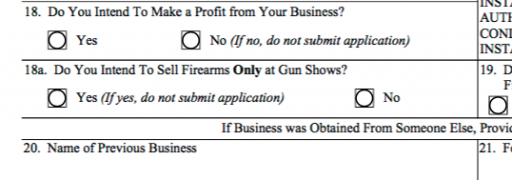The White House has released a press statement (which I do not yet have a link to)Â [UPDATE: The link can be found here.] announcing their plans. I have to say, for the most part, it’s a big nothingburger. The EO plan is far less bold and ambitious than I was expecting, but we are dealing with a semi-retired President here. Here’s some text from the press release:
Clarify that it doesn’t matter where you conduct your business—from a store, at gun shows, or over the Internet: If you’re in the business of selling firearms, you must get a license and conduct background checks. Background checks have been shown to keep guns out of the wrong hands, but too many gun sales—particularly online and at gun shows—occur without basic background checks. Today, the Administration took action to ensure that anyone who is “engaged in the business†of selling firearms is licensed and conducts background checks on their customers. Consistent with court rulings on this issue, the Bureau of Alcohol, Tobacco, Firearms and Explosives (ATF) has clarified the following principles:
o A person can be engaged in the business of dealing in firearms regardless of the location in which firearm transactions are conducted. For example, a person can be engaged in the business of dealing in firearms even if the person only conducts firearm transactions at gun shows or through the Internet. Those engaged in the business of dealing in firearms who utilize the Internet or other technologies must obtain a license, just as a dealer whose business is run out of a traditional brick-and-mortar store.
o Quantity and frequency of sales are relevant indicators. There is no specific threshold number of firearms purchased or sold that triggers the licensure requirement. But it is important to note that even a few transactions, when combined with other evidence, can be sufficient to establish that a person is “engaged in the business.†For example, courts have upheld convictions for dealing without a license when as few as two firearms were sold or when only one or two transactions took place, when other factors also were present.
o There are criminal penalties for failing to comply with these requirements. A person who willfully engages in the business of dealing in firearms without the required license is subject to criminal prosecution and can be sentenced up to five years in prison and fined up to $250,000. Dealers are also subject to penalties for failing to conduct background checks before completing a sale.
What is this? Just a finger wagging? There don’t seem to be any specific numbers attached to this like we were expecting. It’s a restatement of current law. I’m not sure how this changes anything. Maybe they are planning to prosecute more marginal cases they wouldn’t have taken to court previously?
Require background checks for people trying to buy some of the most dangerous weapons and other items through a trust or corporation.  The National Firearms Act imposes restrictions on sales of some of the most dangerous weapons, such as machine guns and sawed-off shotguns. But because of outdated regulations, individuals have been able to avoid the background check requirement by applying to acquire these firearms and other items through trusts, corporations, and other legal entities. In fact, the number of these applications has increased significantly over the years—from fewer than 900 applications in the year 2000 to more than 90,000 applications in 2014. ATF is finalizing a rule that makes clear that people will no longer be able to avoid background checks by buying NFA guns and other items through a trust or corporation.
This is 41p, but it says ATF is finalizing the rule. They’ve been doing that for months now. Will they finish? What’s the timeline?
Ensure States are providing records to the background check system, and work cooperatively with jurisdictions to improve reporting.  Congress has prohibited specific categories of people from buying guns—from convicted felons to users of illegal drugs to individuals convicted of misdemeanor crimes of domestic violence. In the wake of the shootings at Virginia Tech in 2007, Congress also created incentives for States to make as many relevant records as possible accessible to NICS. Over the past three years, States have increased the number of records they make accessible by nearly 70 percent. To further encourage this reporting, the Attorney General has written a letter to States highlighting the importance of receiving complete criminal history records and criminal dispositions, information on persons disqualified for mental health reasons, and qualifying crimes of domestic violence. The Administration will begin a new dialogue with States to ensure the background check system is as robust as possible, which is a public safety imperative.
Oooh, a new dialog. That’ll show them!
Make the background check system more efficient and effective. In 2015, NICS received more than 22.2 million background check requests, an average of more than 63,000 per day. By law, a gun dealer can complete a sale to a customer if the background check comes back clean or has taken more than three days to complete. But features of the current system, which was built in the 1990s, are outdated. The Federal Bureau of Investigation (FBI) will take the following steps to ensure NICS operates more efficiently and effectively to keep guns out of the wrong hands:
o FBI will hire more than 230 additional NICS examiners and other staff members to assist with processing mandatory background checks. This new hiring will begin immediately and increase the existing workforce by 50 percent. This will reduce the strain on the NICS system and improve its ability to identify dangerous people who are prohibited from buying a gun before the transfer of a firearm is completed.
o FBI has partnered with the U.S. Digital Service (USDS) to modernize NICS. Although NICS has been routinely upgraded since its launch in 1998, the FBI is committed to making the system more efficient and effective, so that as many background checks as possible are fully processed within the three-day period before a dealer can legally sell a gun even if a background check is not complete. The improvements envisioned by FBI and USDS include processing background checks 24 hours a day, 7 days a week to improve overall response time and improving notification of local authorities when certain prohibited persons unlawfully attempt to purchase a firearm.
Again, nothingburger. Though, there is a lot of potential for abuse here, in terms of retaining records the law says have to be destroyed. We’ve seen them do that before.
The release also notes that the President is asking for a lot more funding to hire more ATF agents, to enhance to National Integrated Ballistics Information Network, and to establish an Internet Investigations Center inside ATF to track “illegal online firearms trafficking.”
Ensure that dealers notify law enforcement about the theft or loss of their guns.  Under current law, federal firearms dealers and other licensees must report when a gun from their inventory has been lost or stolen. The regulations are ambiguous, however, about who has this responsibility when a gun is lost or stolen in transit. Many lost and stolen guns end up being used in crimes. Over the past five years, an average of 1,333 guns recovered in criminal investigations each year were traced back to a licensee that claimed it never received the gun even though it was never reported lost or stolen either. Today, ATF issued a final rule clarifying that the licensee shipping a gun is responsible for notifying law enforcement upon discovery that it was lost or stolen in transit.
I don’t really have a problem with this, to be honest.
Include information from the Social Security Administration in the background check system about beneficiaries who are prohibited from possessing a firearm.  Current law prohibits individuals from buying a gun if, because of a mental health issue, they are either a danger to themselves or others or are unable to manage their own affairs. The Social Security Administration (SSA) has indicated that it will begin the rulemaking process to ensure that appropriate information in its records is reported to NICS. The reporting that SSA, in consultation with the Department of Justice, is expected to require will cover appropriate records of the approximately 75,000 people each year who have a documented mental health issue, receive disability benefits, and are unable to manage those benefits because of their mental impairment, or who have been found by a state or federal court to be legally incompetent. The rulemaking will also provide a mechanism for people to seek relief from the federal prohibition on possessing a firearm for reasons related to mental health.
We’ve known about this. It’s old news. It doesn’t even say they are finalizing a new rule, just that they will begin the rule making process.
Finally, Obama is directing federal agencies to look more into smart gun technology and increase R&D efforts, and look into smart gun procurement by federal agencies if they would meet “operational needs.”
So he’s basically just restating current efforts, and not really changing anything about “engaged in the business.” This is a lot less ambitious and bold than I was expecting.





